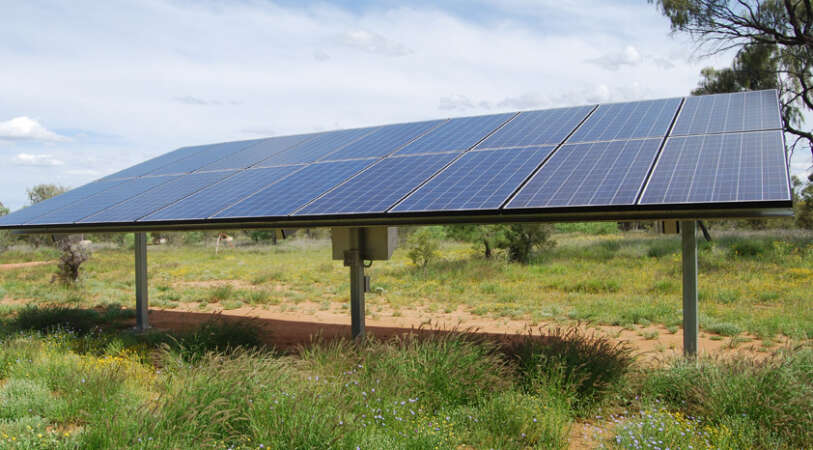| Manufacturer | Sungrid |
|---|---|
| Array Rating | 5.04kW |
| PV Technology | poly-Si |
| Array Structure | Fixed: Ground Mount |
| Installed | 2010 |
View on Map Graphs Download Data
Current Output

Sungrid polycrystalline silicon array, fixed ground-mountPolycrystalline cells are cut from silicon blocks composed of multiple silicon crystals of varying size and orientation.
The different crystals that make up polycrystalline cells can be seen on their surface as a mosaic-like pattern. Polycrystalline panels are typically less efficient than monocrystalline panels because of inefficiencies associated with the defects that form between the borders of crystals. However, polycrystalline panels are generally less expensive than monocrystalline panels due to their lower manufacturing costs.
These Sungrid polycrystalline panels have been designed in a large size format so that fewer panels are needed for an array. This can reduce installation costs.
Sungrid is an Australian solar energy company that distributes high quality solar panels to customers around Australia, New Zealand and the UK.
| Array Rating | 5.04kW |
|---|---|
| Panel Rating | 280W |
| Number Of Panels | 18 |
| Panel Type | Sungrid SG-280P6 |
| Array Area | 35.12 m² |
| Type Of Tracker | N/A |
| Inverter Size / Type | 6 kW, SMA SMC 6000A |
| Installation Completed | Mon, 15 Mar 2010 |
| Array Tilt/Azimuth | Tilt = 20, Azi = 0 (Solar North) |

Notes on the Data
-
System Disconnection for Cabling Works
All arrays at the Solar Centre were disconnected from approximately 2.00pm to 3.00pm on Monday, 9 July 2018 in preparation for the cable between the main switchboard and distribution board being upgraded. Array sites #23-38 remained disconnected while the main feeder cable to these sites was replaced in subsequent days, but all systems were re-connected by early afternoon on Thursday, 12 July 2018.
-
Monitoring Interruption for UPS Battery Replacement
The disconnection and re-connection of the solar arrays and weather station equipment while a new site connection was being established prompted the already flattening UPS batteries which power the site’s energy meters to fail and require immediate replacement. Data recording was affected from approximately 2.30pm ACST, Monday 10 July to 4.00pm, Wednesday 12 July.
Affects weather data for DKASC, Alice Springs
-
System Outage - Sites 4, 5, 17, 20, 22, 34 and 35
On the 5th June 2015, A Friday before a long weekend, seven individual PV systems at the DKASC were switched off by unknown persons and for unknown reasons. The outage was not noted until the following Tuesday when O&M staff returned to work and found the main circuit breakers for sites 4, 5, 17, 20, 22, 34 & 35. turned off. These systems were all turned back on again on the 9th March when the problem was detected.
> Answer to Spotlight Question
Onsite at the DKA Solar Centre in Alice Springs are a series of quiz-like Spotlight Questions at each array. Visit the centre and scan the QR code at each sign to test your knowledge – and check your answer here!
Q: What are the main differences between polycrystalline and monocrystalline silicon modules?
A: Polycrystalline modules are made of cells that each comprise multiple crystals of silicon. By contrast, each cell in a monocrystalline module has only one crystal. This makes polycrystalline modules slightly less efficient due to the many crystal boundaries which can "trap" electrons rather than letting them flow freely to produce a current. However, polycrystalline modules are slightly cheaper to manufacture and purchase, are more common, and can handle warm conditions more efficiently although this drops off more quickly at rising temperatures.
